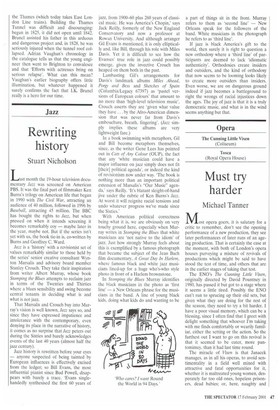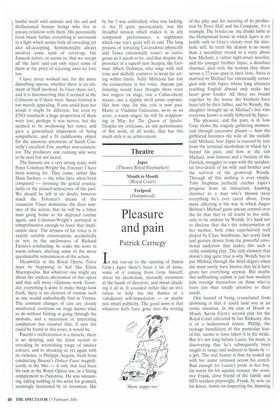The Cunning Little Vixen (Coliseum) Tosca (Royal Opera House)
Must try harder
Michael Tanner
Most opera goers, it is salutary for a critic to remember, don't see the opening performance of a new production, they see later performances of later runs of an ageing production. That is certainly the case at the moment, with both of London's opera houses purveying a mixture of revivals of productions which might be said to have stood the test of time, and others that are in the earlier stages of taking that test.
The ENO's The Cunning Little Vixen, originally directed by David Pountney in 1980, has passed it but got to a stage where it seems a little tired. Possibly the ENO can't run to sprucing up their old sets, but given what they are doing for the rest of the season, they need to try a bit harder. I have a poor visual memory, which can be a blessing, since I often find that I greet with delight something that whoever I'm taking with me finds comfortably or wearily familiar, either the setting or the action. So the furthest out I want to go on this revival is that it seemed to be cuter, more pantomimey, than it had last time round.
The miracle of Vixen is that Janacek manages, as in all his operas, to avoid sentimentality in a field well mined with attractive and fatal opportunities for it, whether it is maltreated young women, desperately far too old ones, hopeless prisoners, dead babies; or, here, naughty and
lustful small wild animals and the sad and disillusioned human beings who live in uneasy relations with them. His perennially fresh music bathes everything it surrounds in a light which seems both all-revealing yet also all-accepting. Sentimentality always involves some kind of cover-up. but Janacek insists, or seems to, that we accept all 'the facts' and can only reject some of them at the price of rejecting ones we love too.
I have never worked out, for the more disturbing operas, whether there is an element of bluff involved. In Vixen there isn't, and it is disconcerting that it seemed at the Coliseum as if there were. Susan Gritton is too merely appealing. If one could hear her words it might be different, but even by ENO standards a huge proportion of them were lost; perhaps it was nerves, but she seemed to be swallowing her notes, and gave a generalised impression of being sympathetic, and a fit cuddlesome object for the amorous attentions of Sarah Connolly's excellent Fox, another non-enunciator. The predatory and cunning side were to be seen but not heard.
The humans are a very strong team, with Peter Coleman-Wright the Forester I have been waiting for. They come, rather like Hans Sachses — the roles have often been compared — stressing the genial avuncularity or the pained senescence of the part. We should be left in no doubt, however much the Forester's dream of the renascent Vixen dominates the final minutes of the action, that he will be a bitter man going home to his dejected routine again, and Coleman-Wright's portrayal is comprehensive enough to leave that implication clear. •The dryness of his voice is in exactly suitable counterpoint, accidentally or not, to the mellowness of Richard Farnes's conducting: he soaks the score in warm colours, abetting some of the more questionable winsomeness of the action.
Meanwhile at the Royal Opera, Tosea must be beginning to feel like Elena Macropoulos. But whatever one might say about the endless alternation of this opera and that still more villainous work Turandot, everything is done to make things look fresh, there is no element of routine such as one would undoubtedly find in Vienna. The constant changes of cast are closely monitored, everyone on stage knows what to do without hinting at going through the motions, and a succession of interesting conductors has ensured that, if new life could be found in this score, it would be.
Puccini's orchestration is a miracle, there is no denying; and the latest recruit to revealing its astonishing range of sinister colours, and to shocking us yet again with its violence, is Philippe Auguin, fresh from conducting Busoni's Doktor Faust magnificently at the Met — if only that had been his task at the Royal Opera too, as a fitting complement to Palestrina. He was interesting, taking nothing in the score for granted, seemingly fascinated by its invention. Bar
by bar I was enthralled; what was lacking, in Act II quite spectacularly, was the dreadful tension which makes it, in any competent performance, a nightmare which one can't quite will to end. The long process of torturing Cavaradossi physically and Tosca emotionally wasn't as outrageous as it needs to be, and that despite the presence of a superb new Scarpia, the German Albert Dohmen, who sings with rich tone and skilfully contrives to keep his acting within limits. Nelly Miricioiu has lost the connections in her voice. Anyone just listening would have thought there were two singers on stage, one a Callas-chesty mezzo, one a slightly shrill spinto soprano. Her best time for this role is now past. Mario is Vladimir Galouzine, so-so as an actor, a warm singer; he will be reappearing in May for The Queen of Spades. Despite my criticisms, an nth performance of this work, of all works, that has this much style is an achievement.



































































 Previous page
Previous page